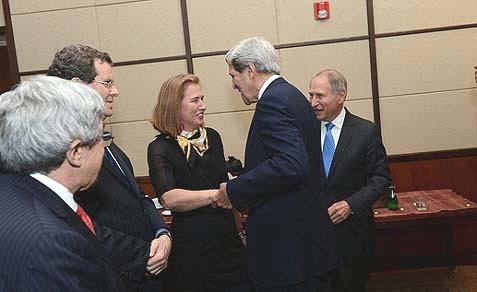Ammon News - WASHINGTON,DC (Haaretz) The coming days will be crucial for both Israelis and Palestinians, U.S. Secretary of State John Kerry said Monday, warning against the dire implications of failing to reach a two-state solution.
In a speech to the American Jewish Committee, Kerry stressed to a strongly pro-Israel crowd the need for urgent progress on a peace deal ending more than six decades of conflict, providing Israel with regional security and the Palestinians with their long-sought independent state.
"If we do not succeed now, we may not get another chance," Kerry said about the peace process, describing it as "hardly a process at all" right now. "I have heard all of the arguments for why it is too difficult to end this conflict," he added. "Cynicism has never solved anything. It has never given birth to a state, and it won't."
Kerry warned that without a two-state solution, Israel will have to choose between its Jewish and democratic nature. He also stressed the need to recognize the fundamental aspirations of the Palestinian people.
Those who believe the Israeli-Palestinian status quo is sustainable and that the separation fence will bring security to Israel are "lulling themselves into a delusion," the U.S. secretary of state said.
"The absence of peace is perpetual conflict. ... We will find ourselves in a negative spiral of responses and counter-responses that could literally slam the door on a two-state solution," he said.
Kerry also warned that Israel would be isolated in the international arena if the standstill continues. The Palestinians have already begun considering opting for unilateral efforts at the United Nations, and if they do so, they will garner more votes than they did last time, when they sought – and achieved – non-member observer state status, he said. Furthermore, the eruption of a protest movement in the West Bank would result in greater deligitimization of Israel, said Kerry, cautioning against the dire potential of what might happen if the Palestinian Authority were to collapse.
The U.S. secretary of state said the best way to guarantee Israel's security would be by reaching a two-state solution, and that one state for two peoples is simply an unrealistic scenario for both sides.
Fifth visit
Meanwhile, U.S. officials said Monday that Kerry will return to the Middle East next week in another bid to revitalize peace hopes, with the contours of a package possibly emerging to lure Israel and the Palestinians back into direct negotiations.
It will be Kerry's fifth trip to the Jewish state since becoming America's top diplomat in February. He will also visit the West Bank and Jordan to push for a restart in face-to-face peace talks between Israeli and Palestinian leaders that broke down nearly five years ago, the -officials said.
"I am confident that both sides are weighing the choices that they have in front of them very, very seriously," Kerry told reporters Monday. "They need to have an opportunity to do that, and I will make a judgment at some point whether I need to go push a little bit or help that process. And I'm certainly willing to. I am open to that possibility, but as I've said, we're not raising any expectations about an American plan or other things."
The officials weren't authorized to speak publicly on Kerry's travel plans and demanded anonymity. But details of the trip dovetail with Kerry's own assessment of the shrinking window for a breakthrough in a process he started with U.S. President Barack Obama's blessing in March.
Interconnected talks
Instead of presenting his own master plan for peace, U.S. ¬officials say Kerry is focused on starting several interconnected talks between the two parties, with the hope that progress on different fronts would entice each side into more flexible peace talks than those that have failed repeatedly in the past.
For the Palestinians, he has tried to curtail Israeli settlement construction in lands the Palestinians hope to include in their future state and recently announced work on a $4 billion plan with international investors to jumpstart the moribund Palestinian economy.
For Israel, the talks would encompass new security arrangements that U.S. ¬officials such as Gen. John Allen have been exploring and a suspension of Palestinian efforts to join multilateral organizations such as the International Criminal Court, where they could push for action against Israel.
Kerry also has secured a key concession from Arab states as part of their decade-old plan to offer Israel comprehensive recognition in exchange for a pullback from territory conquered in the 1967 Six Day War. Their proposal now allows for the possibility of lands swaps across the 1967 lines between the Israelis and the Palestinians, in line with Obama's vision for how a negotiated, two-state solution can move forward.
Numerous obstacles remain, however.
Palestinian President Mahmoud Abbas has told advisers that he is under intense international pressure to return to talks with Israel even though his demand for a Jewish settlement freeze in the West Bank hasn't been achieved. Giving in could spark uproar at home and further weaken support for Abbas.
Following talks last month, Kerry urged both sides to compromise. He voiced U.S. opposition to settlement construction and called on Israel to stop building wherever possible. But in a message to the Palestinians, he said it would be impossible to stop all settlement construction. More than 500,000 Israelis live in the settlements, and dozens of construction projects are underway across the West Bank at any given time.
And while Prime Minister Benjamin Netanyahu continues to press for talks to begin anew, he has yet to present any vision of how the borders of Israel and a future Palestine would be drawn. Two past Israeli leaders have accepted the pre-1967 demarcation as a starting point for negotiations, but Netanyahu hasn't reaffirmed the commitment.
